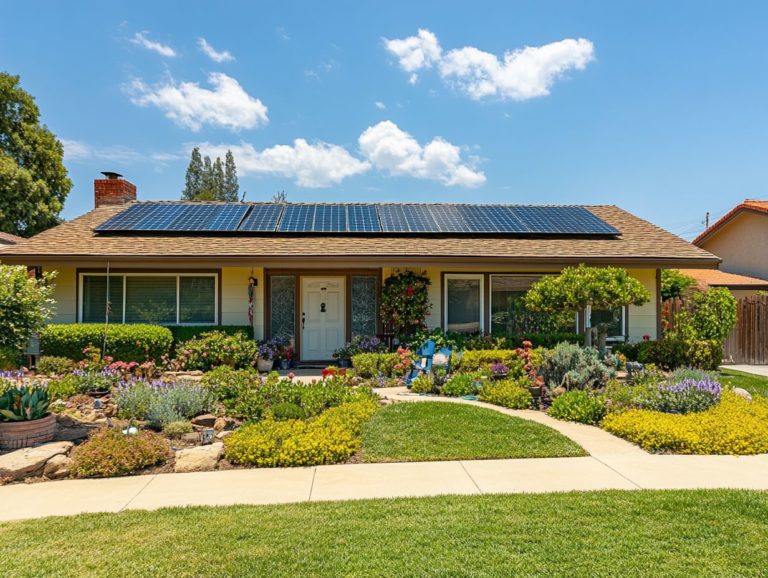5 Essential Questions for Your Home Insurance Agent
Selecting the right home insurance is vital for safeguarding your most valuable asset.
With a multitude of options and intricate details to consider, the realm of home insurance can feel quite daunting.
This guide provides you with essential questions to pose to your home insurance agent. Understanding different coverage types, policy limits, and potential discounts is crucial.
It also demystifies common terms and exclusions. Additionally, it outlines the steps to take after filing a claim.
Delve into this resource to ensure you make informed decisions that will fortify your home s protection!
Contents
- Key Takeaways:
- 1. What Type of Coverage Do I Need for My Home?
- 2. What Events Are Covered Under My Policy?
- 3. What Are the Limits and Deductibles of My Policy?
- 4. Are There Any Discounts Available?
- 5. How Do I File a Claim?
- What Factors Should I Consider When Choosing a Home Insurance Agent?
- What Is the Difference Between Replacement Cost and Actual Cash Value?
- What Are the Common Exclusions in Home Insurance Policies?
- How Can I Lower My Home Insurance Premium?
- What Steps Should I Take After Filing a Claim?
- What Are the Top Mistakes People Make When Choosing a Home Insurance Agent?
- Frequently Asked Questions
- What are the five essential questions to ask your home insurance agent?
- Why is it important to ask these questions to your home insurance agent?
- What types of coverage should I expect in my home insurance policy?
- How much home insurance coverage do I need?
- What discounts are available for home insurance policies?
- How do I file a claim with my home insurance company?
Key Takeaways:

Make sure you have the right type and amount of coverage for your home’s specific needs.
Understand what events are covered and excluded under your policy to avoid surprises in the event of a claim.
Know the limits and deductibles of your policy to ensure you are comfortable with the potential out-of-pocket costs.
1. What Type of Coverage Do I Need for My Home?
When determining the type of coverage you need for your home, it’s vital to assess various factors such as your property’s value and existing liabilities, including considering essential riders for your home insurance.
Also, consider the specific risks associated with natural disasters. This evaluation helps you choose a homeowners insurance policy that truly protects your valuable items.
Don’t overlook the importance of liability insurance; this insurance protects you from lawsuits if someone gets hurt on your property.
Consider specialized coverage options like flood and earthquake insurance, especially if you reside in areas susceptible to these natural events.
Keep in mind that each type of coverage has its own limits, which might not fully safeguard your assets without careful consideration.
A comprehensive review of your insurance needs with guidance from an experienced agent can help you craft a tailored policy, including knowing the key questions to ask your adjuster.
This proactive approach ensures you’re well-prepared for unexpected issues later!
2. What Events Are Covered Under My Policy?
Understanding which events are covered under your homeowners insurance policy is essential for ensuring you have adequate protection against potential risks.
Natural disasters like floods and earthquakes can significantly affect your home’s value and complicate the claims process.
Many homeowners might not realize that standard policies often leave out coverage for specific events.
You may need additional endorsements to be fully protected. Events such as hurricanes, landslides, or wildfires might not be included, leaving you exposed without supplementary plans like flood or earthquake insurance.
Grasping your policy’s exclusions is vital; knowing what isn’t covered can help you avoid unpleasant surprises.
This will give you the power to navigate your coverage more effectively and ensure you receive fair compensation when disaster strikes.
3. What Are the Limits and Deductibles of My Policy?
The limits and deductibles of your homeowners insurance policy are crucial in shaping the financial protection you’ll receive during a claim.
When determining coverage limits, insurers typically consider your home s market value and specific insurance needs.
You often have the flexibility to choose from various deductible amounts. A deductible is what you pay out of pocket before your insurance helps.
Opting for a higher deductible can lead to lower premiums, but it might also mean facing more financial strain if you need to make a claim.
Grasping this balance is essential, as it directly affects the overall effectiveness and accessibility of your coverage when you need it the most.
4. Are There Any Discounts Available?

Many homeowners may not know about the many discounts that can lower your homeowners insurance costs. If you have safety features like security systems or home upgrades, you might qualify.
Bundling your home and auto insurance can unlock significant savings. Keeping an up-to-date inventory of your belongings also helps.
Installing smoke detectors, security cameras, or smart home tech can further reduce your premiums. Talk to your insurance agent to discover all potential discounts that fit your situation.
5. How Do I File a Claim?
Filing a claim can feel overwhelming, but understanding the claims process makes it easier. Gather all necessary documents, like photos of the damage, repair receipts, and your policy number.
Once you have everything, reach out to your insurance provider immediately. You can contact them via their claims phone number or online portal. Timely reporting is vital as many policies have strict deadlines.
If your home is uninhabitable during the claims process, ask about additional living expenses. Your insurer may cover temporary housing costs, which can help ease your stress.
What Factors Should I Consider When Choosing a Home Insurance Agent?
Choosing the right home insurance agent is crucial for your insurance needs. Be sure to consider the best home insurance questions to ask an agent, as well as their experience, customer service quality, and ability to review your coverage.
An ideal agent should understand homeowners, renters, and umbrella insurance. They should also be knowledgeable about questions to ask when choosing home insurance providers to ensure you maximize your savings.
Effective communication is essential; you need an agent who responds quickly with quotes and helps review your past insurance history. For those navigating this process, understanding frequently asked questions about home insurance claims will make the decision-making process easier.
The right agent will not only offer expert knowledge but also build trust and reliability with you.
What Is the Difference Between Replacement Cost and Actual Cash Value?
Understanding replacement cost vs. actual cash value is important when evaluating homeowners insurance. These concepts affect how much you receive during the claims process.
Replacement cost is the amount needed to replace or repair damaged property without considering depreciation. Actual cash value includes depreciation, resulting in a lower payout for repairs or replacements.
This difference can significantly impact homeowners when filing claims. It’s essential to know how each option affects your financial recovery.
What Are the Common Exclusions in Home Insurance Policies?

Home insurance policies often come with specific exclusions that you should know what to look out for. These exclusions can limit your coverage options and leave you exposed to certain risks, including natural disasters.
Many homeowners might not realize that damages from floods and earthquakes are commonly excluded. This can lead to significant financial strain if such disasters strike. These exclusions complicate the claims process, making you ineligible for the coverage you assumed was included.
Understanding mold and pest issues is also important, as they are often overlooked in standard policies. By being aware of these exclusions, you empower yourself to make informed decisions about supplementary policies, ensuring you have comprehensive protection against potential hazards that standard home insurance plans might not cover.
How Can I Lower My Home Insurance Premium?
Lowering your home insurance premium is a savvy financial decision, and you have several strategies at your disposal. Consider leveraging insurance discounts and making home improvements that incorporate safety devices and features.
One effective approach is to increase your deductibles, which is the amount you pay before your insurance kicks in. While this means you ll pay more out-of-pocket in the event of a claim, it can significantly lower your monthly costs.
Enhancing your home security with features like alarms and deadbolts not only protects your property but may also qualify you for discounts. Keeping a detailed inventory of your home is another smart move. This helps demonstrate the value of your possessions to your insurer, which could encourage more favorable pricing.
Additionally, talking with your insurance agent could uncover potential discounts based on your claim history or bundling policies, leading to even greater savings.
What Steps Should I Take After Filing a Claim?
After you file a claim, it s essential to grasp the necessary steps to ensure a smooth claims process and stay updated on your claim s status.
One key aspect is to keep careful records of all communication with your insurance provider emails, phone calls, and submitted documents. This documentation will be your invaluable reference should any discrepancies arise later on.
Be sure to document any damages with clear photographs and detailed notes; this evidence can significantly sway the outcome of your claim. Familiarizing yourself with what to expect throughout the claims journey is equally important.
Understanding the timeline and typical procedures will help you manage your expectations. Most importantly, regular check-ins with your insurance agent will help clarify any uncertainties and ensure the process keeps moving forward.
What Are the Top Mistakes People Make When Choosing a Home Insurance Agent?
Choosing a home insurance agent can feel overwhelming, and it’s easy to fall into common traps that could negatively impact your insurance needs. To avoid these pitfalls, consider reviewing the 5 essential questions to ask your insurer.
Many overlook the quality of customer service and fail to conduct a thorough review of their coverage options. One significant mistake is not gathering quotes from multiple agents, which might leave you grappling with higher premiums and insufficient coverage.
It s also common to overlook your past insurance history, which can cause you to miss out on potential discounts or fail to recognize patterns that could influence future claims.
Neglecting to consider an agent s responsiveness during the claims process can lead to frustrating experiences when you need help the most.
By steering clear of these pitfalls, you empower yourself to make informed decisions and secure the best coverage available for your home.
Frequently Asked Questions

What are the five essential questions to ask your home insurance agent?
- What types of coverage are included in my policy?
- How much coverage do I need?
- What is my deductible?
- What discounts are available?
- How do I file a claim?
Why is it important to ask these questions to your home insurance agent?
Don’t miss the chance to ask these 5 must-ask questions about your home policy! This ensures you fully understand your policy and have the right protection for your home and belongings.
These questions can also help you save money by securing the right discounts and avoiding unnecessary insurance protection.
What types of coverage should I expect in my home insurance policy?
Your policy should cover your home’s structure, personal belongings, liability, and additional living expenses. Sometimes, it also includes protection against specific natural disasters.
Review each type of insurance protection with your agent to ensure you have adequate coverage.
How much home insurance coverage do I need?
The amount of insurance you need depends on your home’s value, your belongings, and your location. To make informed decisions, consider these 5 things to know before buying home insurance, and your insurance agent can help you find the right amount for your situation.
What discounts are available for home insurance policies?
Many discounts are available, including multi-policy, security system, and loyalty discounts. Ask your agent about potential savings on your premiums!
How do I file a claim with my home insurance company?
If you experience damage or loss, contact your insurance agent immediately to begin filing a claim. They will guide you through the necessary steps and documents to ensure you receive the compensation you deserve.





